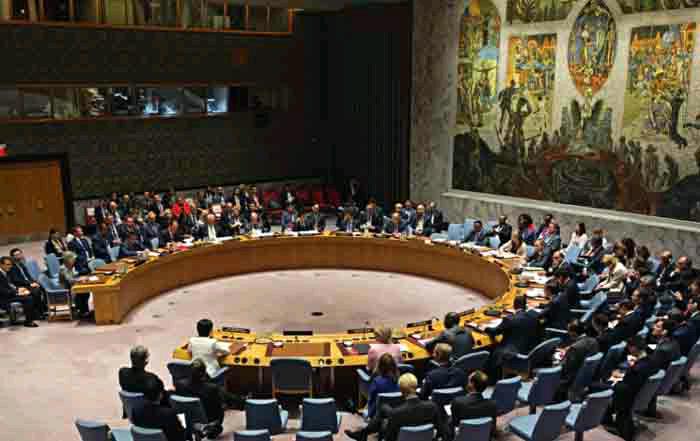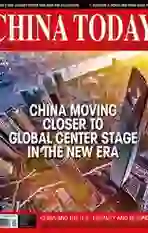Chinese Diplomacy in the New Era
2017-12-28ByWUSIKE
By+WU+SIKE
AMID the development, adjustment, and transformation sweeping the world of our times the relationship between China and the rest of the world is undergoing profound changes. At the 19th National Congress of the Communist Party of China (CPC), General Secretary Xi Jiping declared that socialism with Chinese characteristics has entered a new era, and elaborated on the 14 points that form the basic policy underpinning the nations endeavors to uphold and bring socialism with Chinese characteristics into the new era. Key among them is building a community with a shared future for humankind, which will be the salient feature of Chinese diplomacy in the coming years.
A Community with a Shared Future
With his insight into the increasingly interdependent and interconnected relationship among countries amid shifts in the international relations, Xi Jinping put forward the concepts of forging a new form of international relations and building a community with a shared future for humankind, which aim to lead to times of peace, development, cooperation, and mutual benefit. He called for the world to make economic globalization more open, inclusive, and balanced so that its benefits are shared by all, and to establish a global governance system that objectively reflects the current needs of the international community. This charts the course for global efforts to eradicate the deficits in peace, development, and governance.
Xi announced that China will continue to hold high the banner of peace, development, cooperation, and mutual benefit, take into consideration both domestic and international situations, coordinate its efforts to maintaining development and security, and follow the path of peaceful development. From the perspective of the evolution of human history, he proposed a new form of international relations that centers on winwin cooperation. This epitomizes Chinas global vision of incorporating its own development into the common development of the world and its commitment to shouldering its share of responsibilities in this mission.
The General Secretary has reiterated on several occasions that we must abandon the Cold War mindset and zero-sum thinking now that we have advanced to the 21st century, and follow a win-win approach in handling external relations in the political, economic, security, and cultural fields. Win-win cooperation is Chinas answer to the question “where should international relations go in the 21st century.” It is about replacing confrontation with cooperation, monopoly with shared benefits, and offers a new perspective for all countries to jointly build a better world.endprint
Global Partnership
By incessantly presenting its proposals for the solution of international and regional hotspot issues and problems confronting all humankind, China has demonstrated the resolve to perform its international responsibilities as a major country of the world. Committed to a political settlement of international and regional hotspot issues, China plays a constructive role in bridging differences and promoting dialogue for peace. Dedicated to achieving denuclearization of the Korean Peninsula, China has put forward a dual-track approach and a suspension-for-suspension proposal to advance the negotiated settlement of the Peninsulas nuclear issue through dialogue. These efforts by China have made important contributions to easing tensions on the Peninsula, reviving engagement and dialogue, and maintaining peace and stability in the region. We have taken an active part in seeking solutions to issues as diverse as Afghanistan, the Iranian nuclear issue, Syria, and South Sudan, and worked with other countries to tackle global challenges such as terrorism, climate change, cyber security, and refugees. By doing so, China has demonstrated its sense of responsibility as a major power.
A key component of Chinas foreign policy in recent years is constructing global partnerships. Xi Jinping stressed that China needs to make as many friends as possible and build a global network of partnerships while upholding the principle of nonalignment. Such partnerships are equal, peaceful and inclusive in nature. They are not dominated by any party, or draw lines of division, nor are they directed against any imaginary enemies or third parties.
Springing naturally from Chinas independent foreign policy of peace, these partnerships are built on a commitment to common purposes or a readiness to seek common ground while setting aside differences. They transcend the Cold War mentality of “either with us or against us” that created confrontation between opposing alliances, and present the world with a new modality for developing state-to-state relations. China has established such partnerships with some 100 countries, regions, and international and regional organizations, blazing a new trail in relations between countries that favor dialogue over confrontation, partnership over alliance.
General Secretary Xi Jinping has so far visited more than 50 countries in five continents and major organizations for international and regional cooperation, making extensive and in-depth contact and exchanges with other state leaders, public figures of different walks of life and the general public in these areas. He shared with them exemplary cases of international cooperation of mutual benefit and cherished memories of people-to-people exchanges to highlight the significance of all countries and their peoples working side by side to create a better future.endprint
With its emphasis on neighboring countries and major countries and a solid base of friendly relations with other developing countries, Chinese diplomacy upholds the right approach to justice and interests, constantly enriches the contents of South-South cooperation, and enhances mutual trust, solidarity and cooperation among developing countries. By developing multilateral relations, deepening pragmatic cooperation, enhancing mutual political trust, consolidating social foundations, and improving relevant institutions, China has made all-round efforts in the pursuit of friendly cooperation with all countries, thus advancing its diplomatic agenda in a comprehensive, multilevel, multifaceted way.
A Fair and Equitable International Order
Forging a new form of international relations is the prerequisite to building a community with a shared future for mankind. Xi defined such relations as featuring mutual respect, fairness, justice, and win-win cooperation, which are in keeping with the trend of our times, embody the fine cultural traditions of China and the principle of Chinese diplomacy, and are in accordance with the wishes of most countries in the world.
A highlight of Chinas major-country diplomacy is its deep engagement in global governance and efforts to build a fairer and more equitable international political and economic order. China advocates for and works towards a new form of global governance. It defends the UNs central position and role as the leading channel in dealing with international affairs concerning peace and security, and supports international organizations such as G20, the League of Arab States, and APEC in playing an active role in propelling the international order and system towards greater fairness and justice. By improving the BRICS mechanisms and successfully hosting the BRICS Xiamen Summit, China has helped increase the voice of emerging market countries and developing countries in the global governance system.
With particular attention on innovating concepts and practices of global governance, General Secretary Xi Jinping has drawn on Chinese culture for indigenous thoughts and wisdoms that echo with the reality of this era, giving prominence to the shared wishes of the Chinese people and peoples in other parts of the world. In response to the major issues and challenges facing the world, he has put forward new propositions on global governance, security, development, the right approach to justice and interests, and globalization, which aim to help establish a global governance system that is more equitable and balanced, and whose benefits are shared by all.endprint
These positive developments in Chinese diplomacy can be attributed to the positive changes in Chinas interaction with the rest of the world. China insists that all countries, big or small, are equal. Meanwhile, it holds that as a big country, it should play a bigger role in and make more contributions to defending world peace and promoting common development. In a time when the specter of anti-globalization and protectionism is again rearing its ugly head, these principles and policies put Chinese diplomacy on a moral high ground, and are warmly received and widely endorsed by the international community.
In light of the internal and external changes in advancing Chinas opening-up drive and drawing on the heritage of the ancient Silk Road, General Secretary Xi Jinping creatively gave the overture of building the Silk Road Economic Belt and 21st Century Maritime Silk Road under the principle of extensive consultation, joint contribution and shared benefits. The Belt and Road Initiative further connects Chinese development with that of the larger world, sets up a new platform for China and the rest of the world to share development opportunities, and creates a new mode of international cooperation.
In the four years since the initiative was first proposed, it has evolved from a concept on paper into an open, inclusive platform for international cooperation, and has spawned international public goods that are widely welcomed. More than 100 countries and international organizations have offered support for or participated in the initiative; a good number of influential projects have been executed. Chinas development strategies are being smoothly aligned with those of many other countries, and infrastructure connectivity has been increased accordingly. The fruitful Belt and Road Forum for International Cooperation, convened in Beijing in May, reinforced the joint efforts by all parties concerned in building the Belt and Road, and added new impetus to global development.
The Belt and Road traverses the Eurasian continent, connecting the burgeoning East Asian economic circle at one end and the developed European economic circle at the other, with a vast number of developing countries in Central Asia, West Africa, and North Africa in between. With the goals of policy coordination, facilities connectivity, unimpeded trade, financial integration, and people-to-people bond, the initiative is expected to open up safe and efficient transport passages over the distance by taking advantage of international land routes, relying on core cities along the Belt and Road and using key economic industrial parks as cooperation platforms.endprint
The 19th National Congress of the CPC reaffirmed Xi Jinpings status as the leadership core of the Party and the state, which offers the important guarantee for healthy development of all undertakings in China. The General Secretary has stated on several occasions that China will always be a force for world peace, contributor to global development, and defender of international order. He stressed that Chinese people are patriotic, and at the same time have a global vision. China will take on more international responsibilities within its capacity, join hands with other countries worldwide to defend human conscience and international rules, and remain a force of justice in international and regional affairs.
Under the guidance of Xis thought on foreign relations, China will continue to play an active role in the international community, present more initiatives and plans that will rally global consensus and actions, and share more of its development opportunities with the rest of the world. Chinese diplomacy will write new chapters of splendor as the country presses along the path of peaceful development. By pooling their strength, China and other countries will work side by side to create a better future for humanity.endprint
